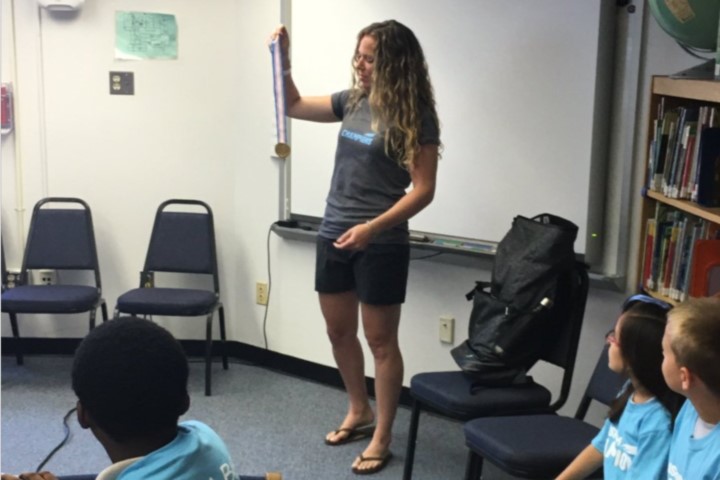Alex Rigsby, gold-medalist on the U.S. Women’s Olympic Hockey team, returned from the Olympic Games in PyeongChang, South Korea to a drastically different environment.


Alex Rigsby, gold-medalist on the U.S. Women’s Olympic Hockey team, returned from the Olympic Games in PyeongChang, South Korea to a drastically different environment.
The 26-year-old spent her second year in the Classroom Champions program working as a mentor in four elementary classrooms, two in Alexandria, Virginia and two in Portland, Oregon, The 74 Million reports.
Rigsby discussed how the experience has made an impression on both her and the students, and what she hopes to accomplish through the mentorship.
The best part of the experience, she said, is “seeing the impact it has on children.
“It is so fun interacting with them and seeing the progress they are making throughout the year and the different challenges that they accept and meet from what I give them each month,” Rigsby told The 74.
“I was lucky to be able to see two classrooms of mine last year,” she added. “It was just so awesome to see all the kids and how excited they were, and see them look to me as a friend and get excited to work on their goals and perseverance and all the different types of things we talk about.”
Rigsby explained how sports or students’ other passions can help students develop habits and virtues for success at school and later in life.
“I think it is about setting goals for themselves. That is one of the biggest things we preach to them: It is about goal setting and chasing your dreams,” Rigsby said. “Sports are just such a great thing for any kid to have, and if they take it to a high level or not, they are going to be able to learn some lessons from it, and if they can take anything they learn and move forward with it, it is going to help them in their life.”
Researchers at the Institute for Advanced Studies in Culture at the University of Virginia emphasize and support efforts to help students overcome adversity as a critical component of effective character education, which extends to students’ mental state, home life, and after school community.
James Davison Hunter, sociologist and Institute founder, wrote in “The Tragedy of Moral Education in America”:
The form of character is one thing, but the substance of character always takes shape relative to the culture in which it is found.
The Jubilee Centre for Character and Virtues takes a deeper look at the character virtues that drive student success and the role character education can play in helping students succeed in the report “Flourishing From the Margins.”
The project reviewed data on 3,250 students from a variety of backgrounds to “illuminate the vital practical work that tutors, youth workers, and community leaders do every day in supporting and guiding marginalised young people to build character and become moral, engaged, intelligent members of an increasingly complex and challenging society.”
“Flourishing From the Margins” also offers a suite of teaching resources for educators interested in forming character in students, as well as recommendations for schools working to develop a positive culture that values strong character and virtues.